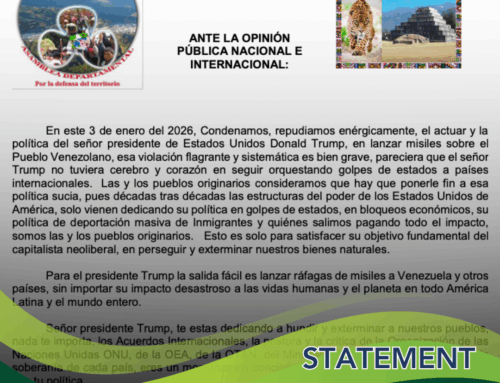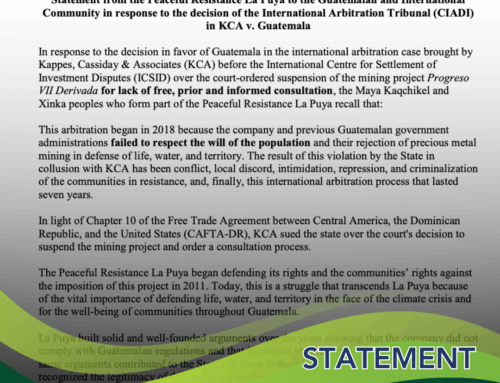In the past several weeks, communities and organizations in Huehuetenango have noted an increase in U.S. and Guatemalan military presence in their territories. This unexplained and unapproved military presence has caused great consternation in a region that was a target of the military’s “scorched earth” policies during the internal armed conflict, and continues to be subject to militarization, as the government and corporations collaborate to impose extractivist projects by force. These concerns have grown as the U.S. Department of Homeland Security (DHS) announced an agreement with the Guatemalan government to send its security personnel to the Huehuetenango region, purportedly to stem migration and human trafficking.
Beginning in May 2019, U.S. soldiers arrived in the region for an annual joint military exercise called Beyond the Horizon, under the pretext of providing humanitarian assistance on engineering, construction, and health care projects. According to the Southern Command website, the exercise also served for “conducting valuable deployment training.” U.S. military personnel was accompanied by Guatemalan military, entailing a highly visible joint military presence throughout the department. Guatemala partner organizations have also noted an increased presence of other US government employees, like USAID workers, who have frequently served as sources of intelligence for the US government.
While communities experienced a highly visible military presence in Huehuetenango, it was reported that on May 31, Guatemala’s ambassador to the U.S. Manuel Espina had met with a Texas congressman Vicente Gonzalez, indicating that the Guatemalan government wanted U.S. military presence in border regions. This meeting followed an April suggestion from Gonzalez to President Trump calling on him to intervene militarily; it also followed a visit by Gonzalez to Guatemala from May 25 – 29, in which he met with Jimmy Morales and many problematic members of the Guatemalan private sector, including the Guatemalan-American Chamber of Commerce (AmCham), CACIF, and AGEXPORT.
That same week, Acting Secretary of the U.S. Department of Homeland Security, Kevin McAleenan, arrived in Guatemala, where he signed a Memorandum of Cooperation with Guatemalan Interior Minister, Enrique Degenhart. The agreement will mean more cooperation between U.S. and Guatemalan security and intelligence forces, and the presence of “a sizable force of [federal] agents and investigators to Guatemalan regions bordering Mexico.”
While in Guatemala City, McAleenan also met with huge corporations, including Walmart, to talk about their “corporate social responsibility” initiatives. Furthermore, he held a meeting with the Commission on the Agreement for Peace and Development in San Mateo Ixtatán, along with U.S. Ambassador Luis Arreaga, USAID employees, and the Guatemalan National Program for Competitivity (Pronacom). The Peace and Development Plan – the result of a corporate “dialogue” initiative organized by Energia y Renovación (responsible for the forced imposition of three hydroelectric projects and attendant human rights violations in Ixquisis) and hand-picked supporters – heavily emphasizes police presence, militarized borders, and hydroelectric projects as supposed sources of development. Later, McAleenan went to the Huehuetenango region, where he “stressed the importance of public-private partnership in addressing the [area’s] economic challenges.” Regional partners in the Plurinational Ancestral Government noted that while McAleenan originally planned to meet with them while in the territories to hear the voice of affected Indigenous communities, U.S. officials eventually denied them a meeting after speaking to supporters of the Ixquisis hydroelectric projects.
Once again, the U.S. government threatens communities’ safety and self-determination, as well as their territorial integrity through an extractivist model of development, imposed through militarization.
Communities and organizations in Huehuetenango consider this a violation of the Peace Accords, an invasion, and a threat against their security and well-being.
This article was written with the support of Guatemala Human Rights Commission and our partners in Huehuetenango, including Departmental Assembly of the Peoples of Huehuetenango (ADH) and Ancestral Plurinational Government of the Akateo, Chuj, Popti, and Q’anjob’al Original Nations.






Leave A Comment